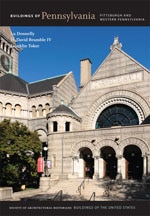This small, simple rectangular log chapel is a remarkable artifact of the 1850s. A shingled square tower with a conical roof rises above wood-paneled double doors facing the forest that is steadily encroaching on the site and its cemetery. It is evocative of what Benedictine monk Boniface Wimmer called the “wild country” in 1854 (see WE26 and St. Mary's in Elk County). Entering the quiet, empty space of the chapel, graced only with a simple wooden altar table, one can imagine the sound of horse-drawn wagons and of wolves in the night. A hanging chimney heats the space and a small balcony, supported by narrow beams, lends access to the bell tower. The chapel's name derives from the land's donor, an Alsatian named Severin Nebel, who was named for St. Severin, Bishop of Cologne in the fourth century. Adjacent to this chapel and its surrounding cemetery is a stone church built one hundred years later, also called St. Severin.
You are here
St. Severin's Log Chapel
If SAH Archipedia has been useful to you, please consider supporting it.
SAH Archipedia tells the story of the United States through its buildings, landscapes, and cities. This freely available resource empowers the public with authoritative knowledge that deepens their understanding and appreciation of the built environment. But the Society of Architectural Historians, which created SAH Archipedia with University of Virginia Press, needs your support to maintain the high-caliber research, writing, photography, cartography, editing, design, and programming that make SAH Archipedia a trusted online resource available to all who value the history of place, heritage tourism, and learning.







